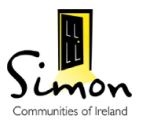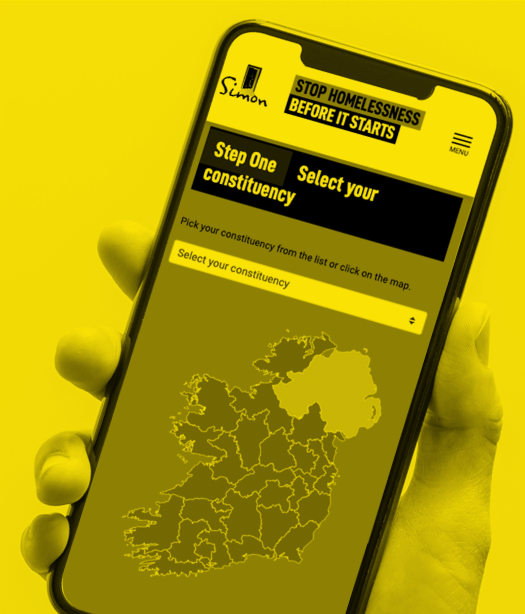The housing and homelessness charity respond to Housing First Implementation Plan
Simon Communities say Housing First is the way forward in responding to homelessness
The housing and homelessness charity respond to Housing First Implementation Plan
26 September 2018: The Simon Communities in Ireland have said that the Housing First Implementation Plan, published today, is very welcome. The housing and homelessness organisation said Housing First is a model that has real potential to change lives and support people to leave homelessness behind for good. Critical to this is implementation; ensuring a supply of secure of affordable housing and then providing visiting support for people in that housing for as long as needed.
Niamh Randall, Spokesperson for the Simon Communities, says that Housing First programmes are recognised internationally as representing best practice in supporting people to move on from homelessness into housing with support and is particularly successful for people who are long term homeless and have complex needs.
‘Housing First means immediately providing a person with a safe, secure and permanent home. Crucially, wrap-around supports are also provided so that people have every chance of maintaining their tenancy for the long-term. It is very welcome to hear the Government re-commit to providing permanent and lasting solutions to rough sleeping and long-term homelessness in Ireland as articulated in this plan. As identified in the report, Simon Communities work with a Housing First model and our experience to date gives a level of tenancy sustainment of approximately 80% plus. This clearly shows that existing Housing First programmes are delivering for those who have experienced chronic homelessness. The cross departmental and agency approach is particularly welcome especially ensuring homeless organisations are at the heart given our experience and expertise.’
‘It is very welcome to see immediate Housing First targets focused on 663 people with highest level of need over the next three years. This is an excellent step in moving to a Housing First model which includes targeted prevention. It is envisaged that in some local authority areas outside the main urban centres the focus will shift to preventing people with high support needs from entering emergency accommodation services, once the needs of the current cohort of people have been addressed by the initial roll-out of the Housing First programme. This is positive as it extends the remit of Housing First to include a preventative model. Preventing people from becoming homeless is key to ending the current crisis and extending the remit of Housing First to include a preventative model would be useful.
‘We welcome the funding commitment for the Step Up Step Down Intermediate Care Centre, this Simon Community facility is for service users who are homeless and require nursing and related care prior to hospital admission and post discharge from hospital. In addition to this, we welcome commitments on capital funding made in the past week to integrate the new development of the Simon Community 100 bed Medical Residential Treatment and Recovery Facility at Ushers Island by Departments of Housing and Health. Health and prevention are extremely important elements in responding to the high demand for harm reduction, addiction treatment and recovery services for those accessing Housing First.’
‘We are particularly pleased to see the expansion of Housing First regionally with Housing First Initiatives in Cork, Limerick, Galway and Waterford as this crisis is impacting all around the country and we support the regional delivery of targets that will allow Local Authorities to develop an integrated regional approach. With current pressures, our Communities regionally are proactively sourcing and procuring one and two bedroom housing for singles and couples, which is of critical need. AHBs will be encouraged to make supply available for HF tenancies.
Niamh Randall, Spokesperson for the Simon Communities, said that wrap-around supports are critical to the success of this model; for example support to live independently, access drug and/or alcohol or mental health services and community integration supports are available to people.
‘We welcome the health supports outlined in the Plan. Health is a significant factor in homelessness and must be addressed in tandem with housing. Access to appropriate healthcare is critical to ensure the success of housing first interventions so people get the supports that they need. These supports must be flexible and available to people for as long as they are needed. For example if a person hits a crisis, support can be increased and intensified. The Department of Health and the Health Service Executive continues to play a critical role in the delivery of Housing First nationally.’
The Simon Communities deliver support, housing, homeless and treatment services to over 11,000 people and families who experience or are at risk of homelessness on an annual basis.
For media queries and interview requests
Helen McCormack
Tel: 01 671 1606/ 085 806 5141
E: communications@simoncommunity.com
About Simon Communities
The Simon Communities support over 11,000 men, women and children. We have almost 50 years of experience providing homeless, housing and treatment services to people facing the trauma and stress of homelessness. We are a network of independent Communities based in Cork, Dublin, Dundalk, Galway, the Midlands, the Mid West, the North West and the South East, responding to local needs and supported by a National Office in the areas of policy, research, communications and best practice. We share common values and ethos in tackling homelessness and, informed by our grassroots services, we campaign for more effective policies and legislation regionally, nationally and at European level. Whatever the issue, Simon’s door is always open for as long as we are needed. For more information, please log on to www.simon.ie
Services include:
- Homelessness prevention, tenancy sustainment and resettlement.
- Street outreach, emergency accommodation and harm reduction.
- Housing with support and Housing First services.
- Homeless specific health and wellbeing services (counselling; addiction treatment and recovery; and mental health supports).
- Personal development, education, training and employment services.
- Foodbanks, drop-in centres and soup runs.

